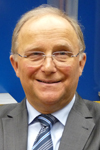Øystein Fischer distinguished by the Kamerlingh Onnes Prize
For his exceptional contributions in the field of superconductivity, Prof. Øystein Fischer will receive the Kamerlingh Onnes Prize 2012 during the conference ‘Materials & Mecanisms of Superconductivity’ held in Washington D.C. this summer. He has been distinguished « for leadership in magnetic super- conductors and pioneering scanning tunnelling microscopy studies in cuprate high-Tc materials ».
Created in 1999 to honour Heike Kamerlingh Onnes, recipient of the Nobel Prize in physics in 1913, this important prize is awarded every three years for outstanding contributions to the development of superconductivity.
Øystein Fischer shares this prize with Herbert A. Mook Jr. of Oak Ridge National Laboratory and Teunis Klapwijk of the California Institute of Technology.
Prof. Øystein Fischer is the founder and director of the Swiss National Center of Competence in Research (NCCR) MaNEP - Materials with novel electronic properties, dedicated to exploring electronic materials of the future. In 1975, Prof. Fischer synthesized the first superconducting compounds containing a regular lattice of magnetic ions - a discovery which launched a decade of international research concerning the interaction between magnetism and superconductivity. This work was highlighted by his discovery in 1984 of superconductivity induced via a magnetic field.
With his team, he then launched the first artificial superlattices of superconductor cuprates which opened up the now rapidly developing fields of thin films and interfaces of oxides.
For the two last decades, Prof. Fischer has been focusing his research on superconductors using scanning tunnelling microscopy (STM) and scanning tunnelling spectroscopy (STS). Using this technique, he observed with his team the vortex cores and the pseudo-gap in cuprates high critical temperature superconductors. Two observations which put in evidence an unexpected difference between classic superconductors and cuprate high-Tc superconductors.
Committed to promoting Geneva’s development, Prof. Fischer is the initiator of the Geneva Creativity Center, which aims to stimulate exchanges between the academic and industrial sectors and to find solutions for the most challenging technological issues. He is also head of the project for ‘The Centre of astronomical, physical and mathematical sciences’ in Geneva, one of the leading projects of the University of Geneva.
Prof. Fischer has received many awards and distinctions including ‘Doctor honoris causa’ by the University of Rennes in 1990; the Gunnar Randers Research Award in 2005; ‘Doctor honoris causa’ by the University of Neuchâtel also in 2005; and the endowed Chair ‘Tage Erlander’ by the Swedish Council for Research in 2009; to being granted this prestigious award today.
July 2, 20122012

